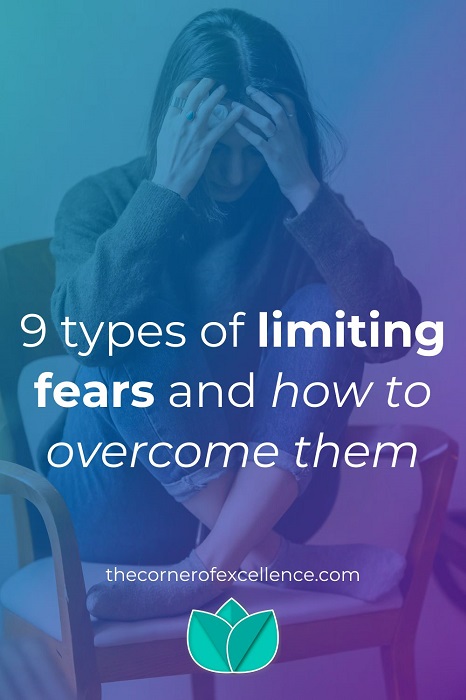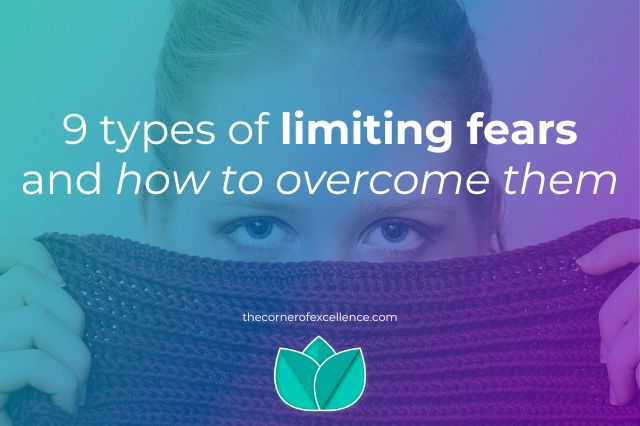I think we are all afraid of something, whether we want to admit it or not. When it comes to fears of situations that rarely occur in our lives, they do not limit us.
But there are kinds of fears that keep us from doing things we should or would like to. There are types of fears limiting our potential, our personal or professional development. Let us go through some typical limiting fears and how to overcome them.
What is fear
To face your fears, it is important to remember that fear is a survival mechanism. Our brain wants to safeguard us against possible dangers and threats to our lives.
However, we can develop fears of things that are not life-threatening. These are types of fears resulting from insecurities. Basically they are fears of what others might think of us or the uncertainty of what may happen.
The good news is that we can overcome our limiting fears, or at least learn to act in spite of them.
Types of limiting fears
Let us review the most common fears that limit your development potential and some ideas to overcome them.
1. Fear of making mistakes
Are you afraid of making a mistake? Do you try to do everything perfectly? Keep in mind that we all make mistakes. In addition, they can almost always be corrected. Perfectionism is not productive. There is a German saying: “The one who does not work, cannot make mistakes”. It means that the only way not to make mistakes is not to work.
That is why it is better to take mistakes as a great learning opportunity. If you were never wrong, you would probably be stuck in your comfort zone and at one level of knowledge. As long as you do not go through life like an elephant in a china shop, assume that to err is human and try with the motto “better done than perfect”.
2. Fear of failure
This limiting fear is related to the previous one. Failure means erring and making mistakes so that we do not achieve what we want. But again, here we have a great learning opportunity. Have you failed? Well, you already know a path that does not take you to your goal. On the other hand, how about calling it a setback instead of a failure? That sounds less drastic and daunting.
Then reflect on what exactly has gone wrong. Was your goal too ambitious? Were you not prepared? Did you take enough steps? Consider what other ways you can try to achieve what you want.
3. Fear of success
Although it may sound paradoxical, we can fear success. This means that consciously or subconsciously you put obstacles to what you want to achieve. The cause may be the definition you have of the word success. Perhaps, when you think of success, you visualise people you do not like. Therefore, you are afraid of becoming such a person if you succeed.
To get rid of this fear, it is convenient to reflect on the concept of success. Forget what society and your environment define as such. Reflect on what it really means to you, so that you feel comfortable with it. Then go and succeed without fear.
4. Fear of uncertainty
The fear of uncertainty is another type of limiting fear that is quite common. Feeling that we do not know what the future or some situation holds for us is uncomfortable. We become attached to what is known and what we seem to be able to control.
The way to deal with this fear is to practice acceptance. It is important to remember that we cannot foresee or control everything. Starting from the acceptance of this fact, we can concentrate on what we can control: our attitude, managing our emotions, and our knowledge. We can prepare and learn, so as to have more resources to face challenges and adversities.
5. Fear of changes
This limiting fear is related to the previous one. Facing change means having to step out of your comfort zone. But being afraid of change is like being afraid of a plant growing. Changes are inevitable because everything evolves.
You were born, you have been a child and now you are an adult. Throughout your life you have experienced many changes, evolved and learned a lot. So maybe you do not fear changes in general but rather specific ones. I suggest you consider what kind of changes you are afraid of and why. Then it might be a good idea to make a list of pros and cons of that change.
Also consider if you lack certain knowledge and skills to feel more prepared and confident for that change. What can you learn? Who can you ask for advice?
6. Fear of novelty
This limiting fear is also related to the previous two. Are you afraid to try new things? Novelty may seem uncertain. And it means having to step out of our comfort zone. But that is precisely where the growth opportunity lies. If you stop yourself from trying new things, you are denying yourself the opportunity to discover exciting things that you may love.
Most of the time we later realise that our fear was much worse than the situation we feared. Trying new things allows you to open your mind. Facing the novelty will give you more confidence in your abilities and to continue trying other new things. All this benefits your personal and professional development.
7. Fear of not being enough
Another fairly typical limiting fear is feeling that you are not enough. Maybe you tell yourself phrases like “I can’t…”, “I’m not good at…”, “I’m not worth it” or “Who’s going to love me”.
Believing that you are not enough can lead to constant dissatisfaction and the continuous attempt to improve in order to change. Or conversely, you may hide in your shell and avoid anything that requires getting out of your comfort zone.
Most likely, you are basing your self-confidence on your abilities. This is what most of us learn. Buddhist philosophies and mindfulness teach you to accept yourself and accept situations without judgment. They teach you that as a living being that breathes you are already enough.
That may be difficult for you to accept. But try basing your self-confidence on giving your best. You will feel more confident when interacting with other people and when facing challenges.
8. Fear of loss of power
This limiting fear arises when we do not treat others as equals but have installed ourselves in a position of superiority. However, deep down we do not have as much self-confidence as we want to appear. That is why we try to dominate others to try to earn their respect. We try to pamper our ego whilst protecting ourselves from somebody discovering our insecurities.
If this limiting fear occurs in people who hold leadership positions or other types of power, problems are guaranteed. At best they are controlling, they do not listen to the opinions of others, they believe that they are always right and that things should be done as they say. In the worst of cases, they are despotic, harass their subordinates or colleagues and openly belittle them.
This fear is not only harmful to the people around them but also to the person themselves. Trying to maintain your status quo is stressful if it is based on maintaining power over others. The way to get rid of this fear is to first admit your insecurities. Then I suggest working on your self-confidence and emotional intelligence. When you learn to accept yourself with your strengths and weaknesses, it will be easier for you to accept others as well. You will learn to interact in a healthier way with other people.
9. Fear of shining
This last limiting fear is somewhat related to the fear of success. It is about the fear of showing oneself as one really is, though that may mean attracting attention. Behind this fear are often hidden limiting beliefs acquired in childhood. Perhaps you were told: ‘better not attract attention’, ‘try to fit in’, ‘a lady doesn’t do that’, ‘standing out is pretentious’, etc.
You have learned to fit in with the crowd and not stand out because that is supposed to be rude. However, in this way you do not show yourself authentically and as you really are. It is not about causing a scene just to attract attention. Rather it is a matter of daring to show your qualities, strengths and personality. It is also about daring to express your opinions as well as share your knowledge and experiences.
We all have our particular baggage of experiences. Fear of shining can prevent you from sharing that gift with the world, helping others, and doing your bit to make the world a better place.
Therefore, review possible limiting beliefs that you have acquired. Which ones no longer serve you? What more positive beliefs can you replace them with?
What are your limiting fears?
Have you recognised yourself in any of the types of limiting fears? Which effect does it have on your personal and professional life? What does this fear prevent you from doing? What will you do to overcome it?

Sharing is caring!




